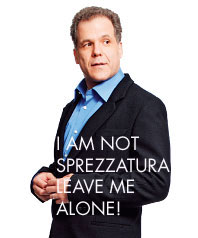Once upon a time, an elephant-sized ego wrote a vapid article about the blank being irrelevant. The article inspired other articles and other blog posts and other comments and other tweets. Never mind that the blank wasn’t dead. Never mind that you could walk into any blankstore and encounter so many blanks that even the most impotent customer couldn’t ignore them. Never mind that you could look upward at the beautiful cerulean sky and see a bountiful blank filled in by the swirling clouds, annotated at ground level by human interpretation. The blank couldn’t be dead. It was like saying that life was dead. And anyone who believed that all human possibilities had halted overnight probably didn’t have much of an existence in the first place.
But for this unnamed and very sad man, the blank was dead. All forms had been filled out. The government had stopped issuing tax forms. There was no more money to collect and no more cash to spend. All calendars had been confiscated. All paper had been taken and filled up with words and scribbles. All pens were removed from homes and offices to prevent any potential blanks from being filled in.
The blank was dead and there was nowhere more for the human race to go. It had ended on June 22, 2010, at 4:53 PM — the very moment that the article had been published. On June 22nd, there was no further need for the human race to feel or think. The human limit had maxed out. It was time for the blankless world to become the new reality.
Humans could no longer feel giddy when they filled in a conversational caesura with a catty quip. They could no longer fill in a crossword puzzle or jot down a liaison with a scandalous lover into a blank square. But weren’t all those feelings trivial? Wasn’t life more comforting when you knew what was happening every damn minute?
Because the blank was dead, every possibility had been prefigured. Every social occasion had been predetermined, down to the guest list and the specific manner in which you dipped a carrot stick into ranch dressing. Every meal had been prepared. If you wanted to order sushi on a whim, well, then you’d have to consult the fatalist texts to see if the decision had already been made. Because the blank was now dead.
Life went on like this for a while. Until people started to understand that the blank had only disappeared because the man had said so. And those who had easily placed their faith in the foolish pachyderm began to wonder why they couldn’t ignore the wrongheaded article that had caused all the fuss. Somehow, the man had willed the blank into dying. Or perhaps he permitted the unimaginative types who couldn’t believe in the blank to come out of the closet — much in the manner that Proposition 8’s passage had revealed dormant homophobia. Fortunately, there were a few doubting Thomases. When those who believed in the elephant felt ashamed by their unthinking leaps forward, it became necessary for some of the more stubborn acolytes to take cold showers. It became necessary for them to find a blank, any blank, with which to funnel their hopes and galvanize their passions. The truly hopeless committed suicide. If the blank wasn’t dead, these sad sacks could demonstrate their commitment to the end in another form.
Of course, for those of us who never believed in the false prophet, there was no such perceptive problem. We were quite happy living our lives, filling in blanks and finding new ones. And for those writers who insist that the blank is dead, one must naturally ask why you’re talking about blanks in the first place if your mind is so blank and your soul is so dead.
(Image: Jo Naylor)




 Why don’t you just get a blog?
Why don’t you just get a blog?